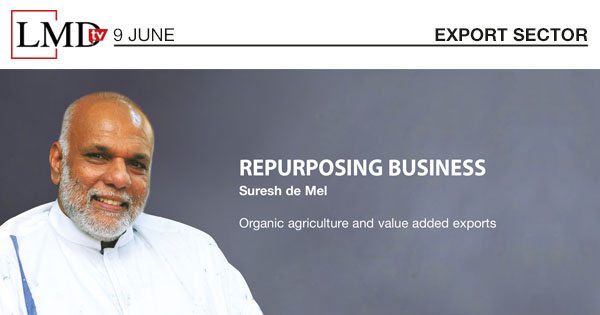LMD TV
In relation to the value of exports surpassing Rs. 1 billion in March, the Chairman of the Sri Lanka Export Development Board (EDB) Suresh de Mel remarked that “exporters showed great resilience through this pandemic by surpassing our expected revised targets.”
 With unpredictability being a constant factor in these times, he believes that forecasting has become a challenge. Instead, de Mel is of the view that considering the export performance over the past five years is a better indicator for the future.
With unpredictability being a constant factor in these times, he believes that forecasting has become a challenge. Instead, de Mel is of the view that considering the export performance over the past five years is a better indicator for the future.
“The agriculture industry has a lot of opportunities with the president introducing organic agriculture – i.e. clean food, which has a huge demand in Europe and other regions,” he pointed out on a recent edition of LMDtv.
De Mel asserted that Sri Lanka has the potential to become the world’s favourite nation for agri produce within three or four years as the island will be producing some of the cleanest food products once it adopts chemical free practices. He added: “Customers will be thrilled because of the reputation Sri Lanka will gain from this.”
He also mentioned that not only fruits and vegetables but some of the other Sri Lankan exports – such as tea, rubber, coconut and spices – are considered to be outstanding in the global arena. “We need to add value,” he said and highlighted the importance of processing and branding products for this purpose.
According to him, postharvest technology is lacking in the country. Along with that, obtaining an organic certification will seal Sri Lanka’s credibility as a 100 percent chemical free producer, pushing its rank up among other nations. “I am looking forward to that and my customers are ecstatic,” he added.
Meanwhile, he asserted that “electronics, IT and business process management (BPM) are some of the least affected industries by the pandemic and therefore, have growth opportunities.”
On the other hand, high freight rates have been an international phenomenon. “Even our competitors are dealing with that,” he noted, emphasising that we need to cope with the situation even though predicting the direction of change is hard.
He observed that exporters have been resilient amid the high freight rates and logistics issues.
De Mel asserted that “the government is committed to improving the business environment,” adding that he continues to converse with other state departments such as Sri Lanka Customs and Sri Lanka Ports Authority (SLPA) on how to improve logistics for exporters.
Moreover, de Mel observed that “some of the SMEs are in the informal sector and don’t follow rules.”
He revealed that the import ban in Sri Lanka was welcomed by foreign buyers due to the tendency of some local suppliers to mix Sri Lankan and imported spices – for example, black pepper from Vietnam or turmeric from India – and re-export them as Sri Lankan products in the international market.
“Today, transparency and traceability such as single origin are more important,” he pointed out. Three aspects are imperative – namely quality, volume and price. According to him, market intelligence supports the quality of export products but volume and price pose challenges for the export sector.
In addition to this, he urged people to “keep an eye on responsible news” and highlighted the value of being inclusive. “I think the government alone cannot solve a crisis of this magnitude without the contribution of the community,” he stated, adding that unity is crucial in these times.
In his concluding remarks, de Mel shared his perceptions on how companies may struggle to stay afloat and pay salaries. “There may be a situation where we have to simply get out of the business we are in and do something else,” he declared.
Using personal examples of his efforts to embrace global networking and repurposing business, he summed up: “The employers also have a responsibility to cope with the reality because the workforce depends on them for guidance.”




